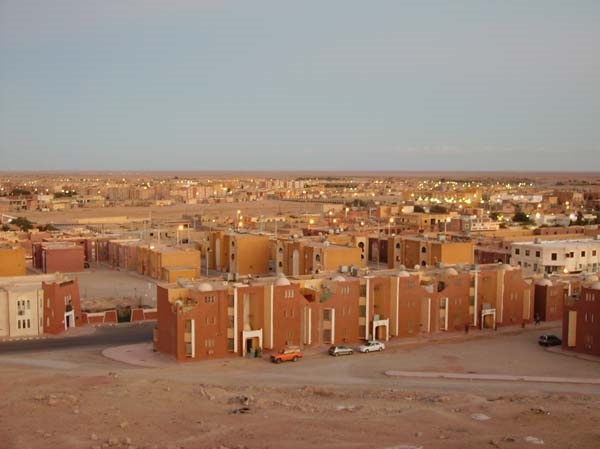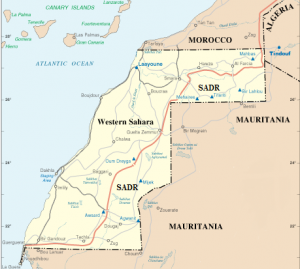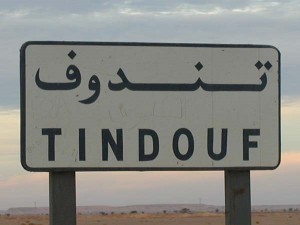
Western Sahara Sidelined for Too Long
With much of the global chatter focused on Syria and Iran, foreign policy discourse has largely ignored the stalemate over Western Sahara. However given the conflict’s implications for Morocco-U.S. relations, regional cooperation, and US security concerns, the U.S. needs to move this issue off the backburner.
Morocco, America’s oldest ally, has been a vital partner to the U.S. in counter-terrorism efforts in North Africa. Terrorist groups such as al-Qaeda in the Maghreb (AQIM)

Based on UN map no. 3691.
have yet to really penetrate Morocco, but many Moroccan nationals have been implicated in attacks world-wide, most notably the 2004 Madrid bombings, stressing the need for continuing strong U.S.-Morocco cooperation.
Since the UN orchestrated a cease-fire in 1991, the Moroccan government and the inhabitant Sahrawi national group, represented by the Polisario Front and the exiled Sahrawi Arab Democratic Republic (SADR) in Tindouf, Algeria, have fought over control of the territory. As it stands today, Morocco controls roughly 80% of the land, with the rest occupied by Polisario communities.
Over the past two decades, U.N. officials have made several attempts to negotiate agreements with little success. Discussions have deteriorated over alleged unchecked human rights abuses by Moroccan forces and accusations of U.N. partiality towards the Sahrawis. Last year Moroccan officials announced they had lost confidence in U.N. envoy Christopher Ross.
Many have argued, and rightly so, that the Western Sahara conflict requires global attention for humanitarian abuses from both Moroccan and Polisario officials. Human rights abuses should never be overlooked.
However there are very critical security concerns that should motivate U.S. policy.
After the fall of the Gaddafi regime in Libya, terrorist and criminal organizations had to seek new ground, many of them moving westward into the Sahel and Maghreb and causing a spike in regional arms flow. The prominence of AQIM and Boko Haram in the region demonstrates this trend, and the emergence of a new terror-crime nexus only exacerbates the threat.
In October, 2011, a splinter faction of AQIM, Movement for Unity and Jihad in West Africa (MUJWA), kidnapped two aid workers in Tindouf. While the Polisario would most likely never associate with terrorist organizations given their desire for greater diplomatic recognition and international allies, reports do exist of potential AQIM presence in the Sahrawi camps.
Even if AQIM or other groups have yet to infiltrate the territory, an unstable region inhabited by politically frustrated groups present a ripe recruiting ground. Some have highlighted the threat that continued abuse and human rights violations will start to radicalize the Sahrawi youth as well.
The U.S. needs to craft a focused and strategic approach to the often ignored conflict given the recent rise in regional security concerns. Western Sahara cannot remain a pawn in the regional power struggle between Algeria and Morocco.
In part due to the African Union’s decision to recognize the SADR government, Morocco is the only African state not a member of the continental organization. The lack of cooperation between Morocco and Algeria, especially with regards to counterterrorism, leaves the region vulnerable to illicit organizations.
Last week Polisario leadership asked for increased U.N. attention and a visit from Sec. Gen. Ban Ki-Moon, and analysts have noted a recent warming in Moroccan-Algerian relations, both indicating that the relevant actors recognize the need to find a solution soon.
However the U.S. should not defer to U.N. efforts. Strong historical U.S.-Moroccan relations gives American officials the unique opportunity to facilitate otherwise icy relations between Morocco, Polisario, and Algeria.
Morocco has made it clear that they will not settle for any solution less than Western Sahara autonomy under Moroccan sovereignty, especially given Western Sahara phosphate reserves and potential for offshore oil drilling. Polisario has rejected recent agreements, demanding a referendum vote.
During ASP and Development Transformations event held yesterday on the future of U.S. stability operations, Nick Lockwood noted that one of the greatest obstacles to institutional and political development in post-Gaddafi Libya was the absence of foreign officials ready to participate—there was no one there. Western Sahara needs the attention of U.S. diplomats and crafters of U.S. national security strategy.
The Western Sahara conflict does not necessarily pose the conspicuous threat of a nuclear Iran, but if left unattended, the region could devolve into a haven for terrorism and extremism.







[…] Western Sahara Sidelined for Too Long […]